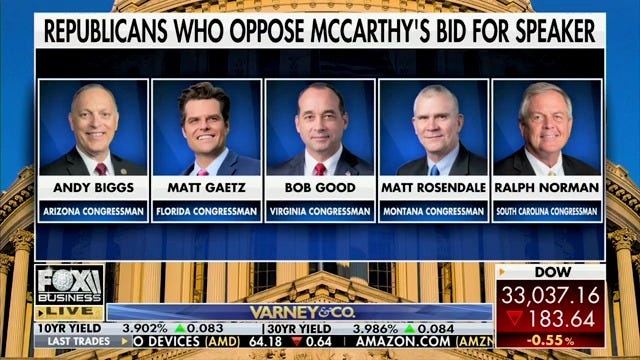Kevin McCarthy's appeasement of MAGA nihilists won't end well
It's impossible to govern in coalition with extremists.

🚨 This is your last chance to take advantage of my holiday special and sign up for a year of Public Notice for just $40, or less than a cup of coffee each month. 🚨 Click the button below to sign up.
In the absence of a credible alternative candidate for speaker of the House, it remains likely that Kevin McCarthy will obtain the gavel on January 3, though he will need every vote he can get, including that of George Santos.
It remains more uncertain, however, whether McCarthy — who has made concession after concession to the most nihilistic factions of the GOP caucus — will be able to prevent the House from descending into chaos over the next two years, let alone whether he will be able to effectively lead the chamber’s very narrow GOP majority.
A brief history of the Freedom Caucus
The increasingly likely failure of McCarthy’s prospective speakership can be traced to 2015, a year that saw the rise of Donald Trump and of the House Freedom Caucus, a GOP House faction devoted to furthering Trump’s attacks on the foundations of democracy, as well as to undermining the House of Representatives itself.
At its founding, the Freedom Caucus appeared to be an outgrowth of the populist Tea Party movement. It counted many ostensible fiscal conservatives, including future Trump OMB Director and Chief of Staff Mick Mulvaney, among its members.
But the Freedom Caucus has never had any remotely substantial affirmative legislative agenda. Rather, what unified the group from its inception is an antagonism to compromise, and a deep affinity for culture warring.
The caucus’s first major “success” was forcing the resignation of Speaker John Boehner. Boehner was hardly a moderate, and was one of New Gingrich’s lieutenants when the GOP took control of Congress in the 1994 election. But the Freedom Caucus and like minded extremists saw Boehner’s willingness to brook compromise with the Obama administration as an unacceptable weakness.
In July 2015, Meadows filed a resolution to “vacate the chair” that, if successful, could have resulted in a vote expelling Boehner from his position. Even some right wing critics argued that Meadows’s gambit only served to demonstrate ruptures in the GOP’s House majority. Boehner ultimately resigned before a vote was held on the resolution.
GOP extremists also reportedly torpedoed the candidacy of then-GOP Majority Leader McCarthy to take Boehner’s place as speaker, likely because Freedom Caucus-types believed he might challenge the nihilists’ ability to upend to operation of the House. Instead, Paul Ryan was elected to the role, but only after he agreed to leave unchanged the procedural rule that allowed one House member to bring a motion to vacate the chair. (McCarthy, coincidentally, reportedly agreed Sunday to demands from Freedom Caucus members for a similar rule.)
During the Trump administration, the Freedom Caucus shed its identification with anything resembling “Tea Party” fiscal conservatism. After joining the Trump administration, Mulvaney became a shameless advocate for Trump’s profligacy (as well as his tax cuts for the rich), as did the Freedom Caucus.

Freedom Caucus members also became known as the most reliable, and reflexive, supporters of Trump and Trumpism. The Freedom Caucus became closely associated with Trump’s xenophobic attacks on immigrants, his increasingly open flirtations with racism and conspiracy theories, and — ultimately — Trump’s frontal attacks upon democratic institutions.
By the end of the Trump presidency, then-Chief of Staff Meadows was serving as the chief facilitator of Trump’s scheme to overturn the outcome of the 2020 election, while Freedom Caucus members in the House were among the leaders of efforts prevent Biden’s victory from being confirmed. Some of them were allegedly involved in even more nefarious aspects of Trump’s insurrection scheme. For example, as reflected in the January 6 Committee report, current Freedom Caucus Chair Scott Perry played a key role in Trump’s effort to render the Justice Department into a tool for his effort to undermine the election’s outcome.
McCarthy’s problem is he needs all the support he can get
As many analyses have demonstrated, Trump, and adherents to his personality cult, exemplified by the Freedom Caucus, were largely responsible for the debacle that the GOP suffered in the midterms. But now that McCarthy is making his second bid for the speakership, Freedom Caucus member have, if anything, more power than they had at the time right wing extremists torpedoed McCarthy’s 2016 speakership bid.
Part of the reason for that state of affairs is a simple matter of math. Although the size of the declared membership of the Freedom Caucus has only hovered between 30 and 40, the small size of the new GOP majority has given it outsized power.
But the relative size of the caucus alone does not explain the ability of GOP extremists to envelop the next Congress in chaos. Also critical has been the decision of GOP “leaders” — and particularly, McCarthy — to cede power to Trump and his followers in Congress, even in the face of resulting, and repeated, electoral catastrophes.
McCarthy, notoriously, declined to whip his members to vote in favor of confirming the results of the 2020 election, resulting in a majority of them voting to nullify the results in the wake of the insurrection. Then, after he briefly criticized Trump following January 6, McCarthy appeared at Mar-a-Lago, where he publicly associated himself with Trump and his coup attempt.



McCarthy’s embrace of Trump after the insurrection turned out to be the beginning of his effort to romance the extremists in his own caucus, a campaign that was also marked by his abandonment of Liz Cheney, his conference chair, over her criticisms of Trump. Even more egregiously, McCarthy has championed of the cause of QAnon conspiracist Marjorie Taylor Greene after Democrats removed her from House committee positions due to her history of embracing antisemitic conspiracies.
McCarthy made efforts to support some more putatively moderate GOP candidates in the primary process. But he also had no difficulty supporting the wackiest of GOP candidates who won their primaries. And in the weeks following the November election, McCarthy accelerated his effort shore up his support among members of the Freedom Caucus and their fellow extremists.
For example, he’s given incoming Oversight Committee Chair James Comer the green light to hold show hearings focused on Hunter Biden, his laptop, and Twitter’s alleged “censorship” of tweets containing nude pictures found on the device.
During a recent joint news conference with incoming Judiciary Committee Chair (and former Freedom Caucus leader) Jim Jordan, Comer became concerned when the press began asking questions diverging from his favorite topic, and exclaimed: "If we can keep it about Hunter Biden that would be great."
McCarthy has also reportedly promised to allow extremists to attempt to impeach one or more Biden administration officials, likely commencing with Homeland Security Secretary Alejandro Mayorkas. It even remains possible that McCarthy will allow them to attempt to impeach Biden, as Greene as been attempting to engineer since her first days in office (and, indeed, before Biden was even sworn in).
With his relentless pandering to the Freedom Caucus and other GOP extremists, McCarthy presumably thought the way would be cleared for him to get the Speaker’s gavel that eluded him in 2015. But at least five recalcitrant GOP extremists have indicated they will vote against McCarthy, with most insisting that he reinstate the rule, voided when Pelosi became speaker, that allowed a single backbencher like Meadows to file a resolution to kick the speaker out of office (as mentioned above, it appears McCarthy is caving to demands of this sort, though he’s reportedly pushing for a rule requiring five votes to introduce a no confidence resolution).
Never mind that such a vote could imperil the GOP’s control of Congress in such a closely divided House — the dissidents plainly desire to be part of a chamber that is on the verge of unraveling at any moment.
McCarthy has not attempted to enunciate a remotely specific legislative program for the next Congress, but he has expressed enthusiasm for extremists’ plans for stonewalling. For example, McCarthy has indicated sympathy for the position of extremists who have preemptively declared that they will vote against any bills championed by GOP senators (let alone Democrats) who had the temerity to vote in favor of the recently passed omnibus spending bill.
Publicly, McCarthy loudly opposed the budget measure; but he almost certainly privately breathed a sigh of relief that it passed, since his pandering to extremists would have made it exceedingly difficult for him to pass a budget measure during the new Congress that could possibly pass in the Senate or gain the president’s signature.
The rubber will soon hit the road
While the passage of the omnibus spending package will provide a prospective Speaker McCarthy with some breathing room, he will eventually face the serious problem of how to govern with a GOP caucus laden with nihilists. The first challenge could come when the federal government’s borrowing comes close to hitting the current debt ceiling at some point during 2023.
McCarthy has committed himself to making extortionate demands for budget cuts in return for a GOP vote in favor of increasing the debt ceiling, a statutory cap on government borrowing that, if exceeded, could cause the federal government to default on Treasury bond payment obligations. Such a default could result in an economic crisis of catastrophic proportions.
In past situations, when Republicans has attempted similar extortion, they’ve backed down in the face of the political catastrophe. Such was the case in 2019, when Trump ended a government shutdown he had caused in a vain effort to obtain funding for his border wall. But, like Trump, the Freedom Caucus, and the other extremists McCarthy has empowered, have strikingly little concern with enhancing, or even preserving, the political prospects of the GOP.
Indeed, extremists’ embrace of efforts to weaken the power of their own congressional leadership — and more importantly, their aggressive efforts to undermine democracy itself — evince a single-minded effort to undermine public confidence in the institutions of government. There is good reason to believe that many of these extremists would welcome the chaos unleashed by a federal government debt default.
A default or similar GOP-wrought governmental cataclysm could well also lead to a political cataclysm for Republicans, and grievously impair the party’s prospects for the 2024 election. But given the inherent weakness of his own prospective speakership, McCarthy is likely to face huge difficulties in coming up with a path out of such a crisis in his own party. As Steve Bannon recently asserted, Greene and fellow “ultra MAGA” House member Matt Gaetz are well positioned to be “de facto” speakers of the House, leaving McCarthy with little room for maneuver.
McCarthy seems unconcerned with the potential disaster looming as a result of his own pandering to extremism. Rather, his single-minded focus is on appeasing just the number of GOP House members necessary for him to become Speaker, regardless of whether that leads to disaster, fiscal or otherwise, in the next Congress.
Democrats should not, however, be anticipating such a disaster with glee. The cost to the country, and indeed the world, arising from such a decomposition of governance in Congress could be extremely high. Freedom Caucus members and their fellow nihilists could well be the only people left pleased with such a result.
That’s it for today
Aaron will be back with more Wednesday.



If McCarthy becomes Speaker, I will put his photo next to a head of lettuce, and the race will be on!
Terrific look back and forward. Thanks for this; perfect re-entry reading. Looking forward to another year of Public Notice’s valuable reporting.